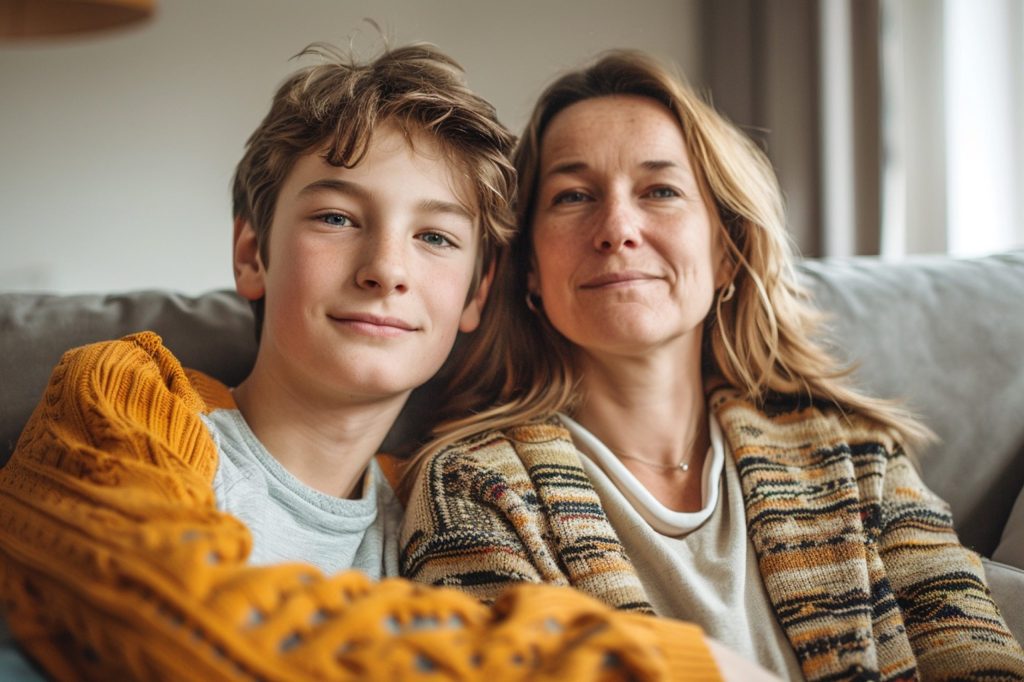You can’t pour from an empty cup
The phone call from school, the slammed door, the late-night worry—the stress of parenting teens with mental health challenges can feel like a relentless storm.
You’ve spent countless hours trying to be their rock, their advocate, and their safe space, but you’re exhausted. You’re running on empty.
This is parent burnout, and it’s a real and debilitating state for so many parents.
You might feel that focusing on your own needs is a luxury you can’t afford right now. But what if the most powerful tool you have for helping your child is your own sense of calm?
The science of co-regulation shows that your well-being isn’t separate from your teen’s healing. It’s at the very center of it.

What is co-regulation? Your calm is contagious
Co-regulation is the process of using our own calm nervous system to soothe and regulate someone else’s.
Think about how you instinctively rock a crying baby or speak in a soft, low voice to a frightened animal. You are lending them your calm. The principle is the same when you interact with your overwhelmed teen.
When a teenager is in high emotional distress (anxiety, anger, panic), their nervous system is in fight-or-flight mode. They are physiologically incapable of thinking logically or calming themselves down.
When parents meet this panic with their own frantic energy, it’s like pouring gasoline on a fire. But when a parent remains grounded and calm, they become an anchor that draws their teen’s nervous system back to safety. This is one of the most effective ways to help a teenager regulate their emotions.

The first step: How to regulate emotions as a parent
You cannot give what you don’t have. Before you can be a calming presence for your teen, you must find that calm within yourself.
This is why supporting mental health for parents is a core strategy for improving the mental health of their teens.
Here are some simple co-regulation strategies for parents to use in heated moments:
- Pause and breathe: Before you react to a slammed door, take one full, slow breath. Inhale for four counts, hold for four, and exhale for six. This simple action can interrupt your stress response.
- Feel your feet: Plant both your feet firmly on the floor. Notice the sensation of the ground beneath you. This is a powerful grounding technique that pulls you out of a panicked thought spiral and into your body.
- Use a calming mantra: Silently repeat a simple phrase, such as “This is a moment of stress, not an emergency,” or “I am the calm in the storm.”
- Get a drink of water: The intentional act of slowly sipping a glass of water can be a surprisingly effective way to reset your nervous system.
These co-regulation techniques aren’t about suppressing your feelings. They’re about managing your own nervous system so you can respond to your child thoughtfully, not reactively.

Putting it into practice: Supporting emotional regulation for teens
Family therapy with teens does more than keep parents in the loop; it fundamentally improves treatment outcomes. Research has consistently shown that the family-focused therapy model leads to more sustainable, long-term success. Here’s why it’s so effective:
- It enhances the environment: A teen doesn’t exist in a vacuum. A family-centered approach can identify and address unhealthy communication styles or dynamics at home, ensuring the teen returns to an environment that fosters continued growth rather than triggers old struggles.
- It empowers parents: Feeling helpless is one of the worst parts of having a struggling child. Family therapy demystifies your teen’s experience and equips you with practical strategies to manage crises, set healthy boundaries, and communicate effectively. It transforms your role from a worried bystander to a confident, skilled ally.
- It builds lasting connection: Mental health struggles can create deep rifts in families. The structured, safe space of therapy allows for honest conversations that rebuild trust, foster empathy, and strengthen a strained parent-child bond.
- It reduces the stigma at home: When the whole family participates, it sends a powerful message to the teen: “You are not the problem. We are in this together.” This shared responsibility removes the shame and isolation your teen may be feeling.

Breaking the cycle of parent burnout
Consistent self-care for parents is the long-term solution to parent burnout. This doesn’t require more spa days (though those are great!). It’s about weaving small, restorative practices into your life.
- Schedule regular “micro-breaks”: Take five minutes to step outside, listen to a favorite song, or stretch.
- Stay connected to your support system: Make time to talk to your partner, a trusted friend, or a therapist. You need and deserve a space to vent and feel supported.
- Protect your sleep: Prioritize your own rest. A rested brain is a resilient brain.
Raising teenagers is challenging, especially when they’re struggling.
But remember, by taking care of yourself, you are not abandoning your child. You are ensuring they have a strong, steady anchor to hold onto when a storm hits. Contact Avery’s House today to learn more about how our family-focused programs can support both your teen and you.